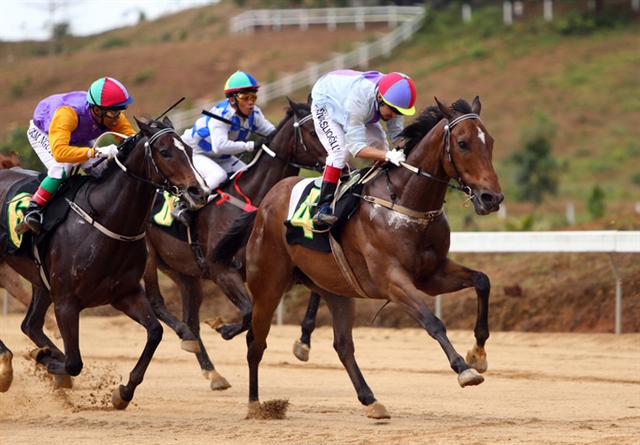With a large development potential of prize-winning entertainment industry such as horse racing and sports totalised and casino, Viet Nam can add some billion of greenback to the budget each year.

If Viet Nam legalises sports betting, billions of dollars could be recouped for the country and help boost tourism post-COVID-19.
That was one of the topics discussed during a seminar in Ha Noi on Tuesday attended by economic experts, government ministries and representatives from betting companies.
Although gambling is currently illegal in Viet Nam, the Ministry of Finance is drafting an amendment to the decree to allow betting on horse racing, greyhound racing and international football.
This, according to those who attended the seminar, could help the country recovery after the COVID-19 pandemic seriously affected tourism.
And they estimated the amount of revenue that would be received if the gambling industry increased, through tax.
Economist Nguyen Mai told Viet Nam News: “It is necessary to have mechanisms and policies to attract investors in the prize-winning entertainment industry as it will help the tourism to gain back.”
According to the Viet Nam National Administration of Tourism (VNAT)’s estimate, if the international tourists increase average spending to about $1,000-1,500 from the current spending of between $400 and $600 per visit, the international tourism revenue in Viet Nam will increase at least $8 billion to $15 billion each year.
A representative from VNAT said the country had potential operating the prize-winning entertainment as 80 per cent of the international tourists to Viet Nam were Asian, many of them enjoying gambling.
He also added that visitors would stay longer and benefit the local hospitality and other relating services.
In addition with the added revenue, Nguyen Van Phung, head of Tax Policy Department from the Ministry of Finance, said: “Viet Nam can have at least 10 per cent from the value added tax from the industry and between 10 and 30 per cent from the special consumption tax.”
However, Nguyen Anh Tuan, editor-in-chief of The Investors Magazine, which organised the seminar said: “While Viet Nam has a great potential to develop the industry, compared to many countries in the region, the local market for prize-winning entertainment is very small."
Do Van Su, Head of Foreign Investment Division from the Ministry of Planning and Investment, said turnover for prize-winning games for foreigners reached VND13.2 trillion in 2019, up 22.8 per cent compared to 2017 and twice as much than in 2013.
While he accepted the market has grown steadily in the past, Su believes there is potential for greater growth, especially if local people are allowed to bet legally as well as foreigners.
Economist Nguyen Mai told Viet Nam News: “The healthy market will help avoid the ‘bleeding’ of foreign currencies through black market gambling and through Vietnamese people going abroad to visit casinos.”
Mai said because gambling had been frowned upon and did not meet the nation's fine customs and traditions, Viet Nam had not yet put such regulations for activities like football betting, horse racing and casino into law.
Mai said: “This will make the country miss the chance to develop the industry which could promote tourism.”
Attending the seminar, president of Vabis Group, Nguyen Ngoc My, which owns a horse racing course, a dog racing course and computer gaming service in Viet Nam said: “Viet Nam needs to have a special organisation to manage the industry which could become a billion dollar industry.”
Michael Efron, chairman and CEO of the Vietnam Sports Player PTY LTD, who has 50 years’ experience in the horse racing industry in Australia, Japan and Korea, said: "This is vital if Vietnam is to promote horse racing and breeding and the integrity within federation member countries to encourage and develop mutually beneficial objectives and strategies between racing organisations."
He feels horse racing would finally encourage, promote and support international competition for trainers, jockeys and horses when conditions permit.
Also at the seminar, Can Van Luc , chief economist of BIDV said according to the World Tourism Organization, Viet Nam was ranked six out of 10 countries with the world's top tourist growth.
Last year, the total revenue from tourists reached VND768.5 trillion, 13 times higher than in 2008, adding tourism's direct contribution in local GDP was 9.2 per cent and indirect contribution of 14 per cent through job creation, on-site export and income generation for local communities.
Luc said: “Compared to other places in the world, it is still relatively low and needs to be better with more services and entertainment.
"It is necessary to change this mindset of banning the things that are not yet well managed. Instead, there is a need for a mechanism and policy to develop the prize-winning entertainment associated with tourism and night economy.”
He suggested to learn from the regional experiences of China, Singapore, Malaysia, adding: “We need to build and complete the legal system of prize-winning activities such as horse racing, dog racing, amusement parks, which can ensure it will go in a direction that boosts tourism and causes no risks.”
Mechanisms and incentives to encourage investors such as land and tax incentives should be also added to the legal system, said Luc.— VNS





